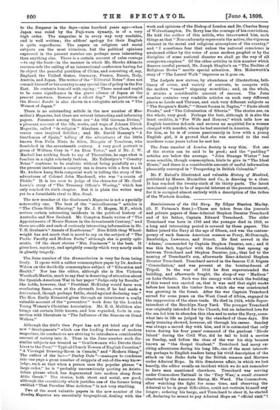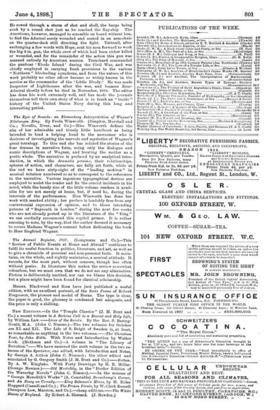Reminiscences of the Old Navy. By Edgar Stanton Maday. (G.
P. Putnam's Sons.)—These are taken from the journals and private papers of Rear-Admiral Stephen Decatur Trenchard and of his father, Captain Edward Trenchard. The elder Trenchard was born in 1785 and the younger died in 1883, so a long and interesting period is covered by these papers. The father joined the Navy at the age of fifteen, and was the contem- porary of such famous American seamen as Perry, McDonough, Bainbridge, Lawrence, and Stuart. He first served in the Adams,' commanded by Captain Stephen Decatur, sen.; and. it was this fact, together with the friendship that sprang up between Trenchard and Stephen Decatur, jun., that led to the naming of Trenchard's son, afterwards Rear-Admiral Stephen Decatur Trenchard. Trenchard served in the famous U.S. frigate
Constellation,' and was present at the bombardment of Tripoli. In the war of 1812 he first superintended the building, and afterwards fought, the sloop-of war ' Madison ' on Lake Ontario. Such was the energy with which the building of this vessel was carried on, that it was said that eight weeks before her launch the timber from which she was constructed was growing in the forest. After the war Captain Trenchard served for some years on the West Coast of Africa, engaged in the suppression of the slave trade. He died in 1824, while Super- intendent of the Brooklyn Navy Yard. The younger Trenchant was originally intended for the Church, but an inherited love for the sea led him to abandon this idea and to enter the Navy, some- what late in life as judged by the standard of these days. His early training showed, however, all through hie career. Sunday was always a sacred day with him, and it is estimated that only twice during his four years' command of the gunboat Rhode Island' during the Civil War, did he fail to hold a service on Sunday, and before the close of the war his ship became known as "the Gospel Gunboat," Trenchard had many ex- citing adventures during his long life, one of the most interest- ing perhaps to English readers being his vivid description of the attack on the Peiho forte by the British seamen and Marines under Admiral Hope. In this disastrous affair, in which we lost heavily, the editor recalls an incident which we do not remember to have seen mentioned elsewhere. Trenchard was serving under Commodore Tattnall in the ' Toey Wan,' a small steamer chartered by the American Envoy, Mr. Ward. The Commodore, after watching the fight for some time, and observing the Admiral to be in great difficulties, could not restrain himself any longer ; ordering his barge, and Trenchard to steer it, he started off, declaring he meant to pay Admiral Hope an "official visit." I
He rowed through a storm of shot and shell, the barge being sunk by a round shot just as be reached the flag-ship The Americans, however, managed to scramble on board without loss, to find the Admiral sorely wounded and seated in an arm-chair on the quarter-deck still directing the fight. Tattriall, after exchanging a few words with Hope, sent his men forward to work the big Sin. gun, the whole crew of which had been either killed or wounded, and for the remainder of the action this gun was manned entirely by American seamen. Trenchard commanded -the gunboat Rhode Island' during the Civil War, and was chiefly employed in carrying fresh provisions to the various " Northern " blockading squadrons, and from the nature of this -work probably no other officer became so widely known in the service as the commander of the 'Little Rhody.' He was made Inspector of Lighthouses after the war, and became Rear- Admiral shortly before he died in November, 1883. The editor has done his work extremely well, and has made the journals 'themselves tell their own story of what is in truth an " inside " history of the United States Navy during this long and interesting period.



































 Previous page
Previous page